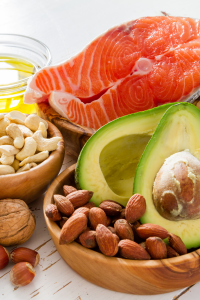Dietary Fat: Is It Good or Bad?
 Both. You see, not all fats are created equal. When it comes to dietary fat, what matters most is the type of fat you eat. Contrary to past dietary advice promoting low-fat diets, newer research shows that healthy fats are necessary and beneficial for health. When manufacturers create low-fat products, they often replace the fat with refined carbohydrates, sugar, and salt to make up for lost flavor.
Both. You see, not all fats are created equal. When it comes to dietary fat, what matters most is the type of fat you eat. Contrary to past dietary advice promoting low-fat diets, newer research shows that healthy fats are necessary and beneficial for health. When manufacturers create low-fat products, they often replace the fat with refined carbohydrates, sugar, and salt to make up for lost flavor.
The Skinny on Fats
Heavily processed, hydrogenated “trans” fats used in prepared, packaged foods can be extremely damaging to the body. They can compromise the cardiovascular system, immune system and contribute to behavior problems. They can also lead to weight gain, skin breakouts, high blood pressure, and liver strain. That said, our bodies need fat for insulation, vitamin and mineral absorption, and to protect our organs. Our brain is 60% fat. So high-quality fats can steady our metabolism, keep hormone levels even, nourish our skin, hair, and nails, and provide lubrication to keep the body functioning fluidly.
Where to Find Healthy Fats
Avocados, olives, whole nuts and seeds, and their butters like almond butter or tahini are excellent sources of healthy fat, along with wild salmon and omega-3 rich free-range organic eggs.
I look for the highest-quality organic oils when shopping. Words to look for: organic, first-pressed, cold-pressed, extra-virgin, and unrefined. Avoid oils that are refined and solvent extracted. Though many claim canola oil to be a healthy fat, it is used ubiquitously in many processed foods. Canola is high in Omega 6’s, and though some Omega 6 is essential in our body, we have created an imbalance with its over use. It is also usually genetically modified. And one last thought, I know I want things as close to their natural state as possible, I have yet to figure out what a canola is.
How to Use Healthy Fats
For cooking at high temperatures (stir-frying and baking), try butter, ghee (clarified butter) an ayurvedic favorite, or coconut oil high in medium-chain fatty acids.
When sautéing foods, try organic cold-pressed extra virgin olive oil. Sauteing at low temps is fine for olive oil.
Oils like flaxseed, sesame, toasted sesame, walnut, and pumpkin seed are best used unheated in sauces or dressings.
When it comes to foods with animal fats, quality makes a huge difference. Grassfed, pasture-raised, makes a difference in the composition of the fat in our animals. Animals fed grains and by-products and do not have an opportunity to roam freely will be fattier and not produce the proper amino acid ratio.
Quality and moderation make a huge difference, but fats are necessary to a healthy diet along with exercise, rest, stress management, and decreasing your toxic load.
Looking for guidance on healthy lifestyle choices? Let’s talk.
